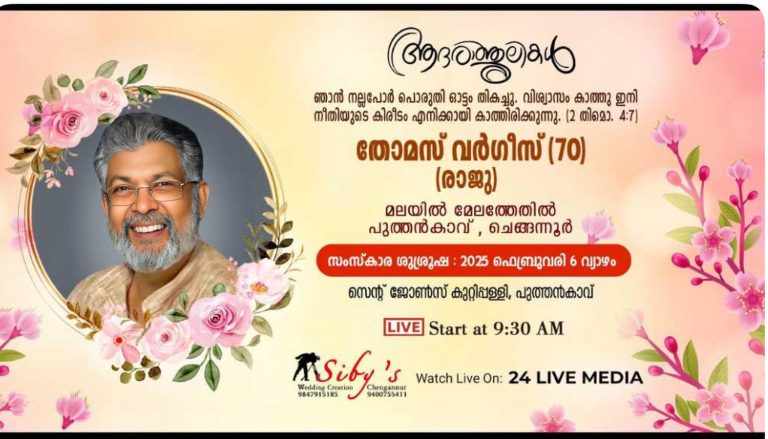
The Indian Constitution establishes a clear separation of powers among the legislature, executive, and judiciary, each serving as a pillar to support democracy. Among these, the judiciary, particularly the Supreme Court, holds a unique position of safeguarding the Constitution and ensuring that laws are interpreted in accordance with justice and democratic principles. When the government chooses to challenge the judgments of the Supreme Court, it raises critical questions about the role of the judiciary, the government’s respect for legal processes, and the potential impact on democratic governance.
The Malankara Church Dispute and the Supreme Court’s 2017 Verdict
The century-long internal disputes within the Malankara Church were conclusively resolved by the Supreme Court’s 2017 judgment. This verdict brought a permanent solution to the issue, and since its implementation, there have been no significant law-and-order concerns. The peaceful resolution within the church and its parishes reflects the effectiveness of the Court’s decision, which has become the law of the land.
Criticism of the Government’s Decision
The stance taken by the government to approach the Court repeatedly after a judgment has been passed is both laughable and condemnable, as it suggests an unwillingness to accept the legal system’s checks and balances. The judiciary’s authority should be respected, especially when it functions as a neutral arbiter in the democratic framework. The government’s persistence in challenging these decisions reflects poorly on its commitment to justice and democracy.
Role of the Judiciary in a Democratic Framework
The judiciary, particularly the Supreme Court, is responsible for delivering well-reasoned judgments based on thorough legal scrutiny. Each case that comes before the Supreme Court undergoes rigorous examination of facts, constitutional principles, and legal precedents. The Court’s verdicts are a culmination of this extensive study and are designed to uphold the rule of law. A democratic government is expected to respect these decisions, even when it disagrees with them, to maintain the sanctity of judicial independence and integrity.
The government’s approach to challenging these judgments repeatedly undermines this principle. By doing so, it signals a potential disregard for the judiciary’s authority and could be seen as an attempt to weaken the constitutional institution meant to protect the rights and freedoms of citizens.
The Importance of the Criticism
The criticism that the government’s position is laughable and condemnable lies in the fundamental expectation that the judiciary should be treated with respect. This critique touches on the balance of power in a democratic society and highlights the risks posed when one branch, particularly the executive, seeks to undermine another.
1. Legal Right to Challenge:
A government has the right to seek a review or reassessment of a judgment if there are valid concerns regarding its correctness. This is an important aspect of ensuring justice and preventing errors in the legal process.
2. Ensuring Fairness in Justice:
By reapproaching the Court, the government may bring to light overlooked facts or legal points that were not adequately considered. This ensures that all angles of a case are thoroughly examined to achieve a fair outcome.
3. Addressing Constitutional Issues:
In cases involving critical constitutional matters, such as the distribution of powers between the branches of government or the protection of fundamental rights, revisiting a judgment may help ensure that the Constitution is being applied correctly and fairly.
Drawbacks of Reapproaching the Court
While there are benefits to the government’s right to seek a review, this approach also has significant drawbacks, particularly when it is perceived as an overreach of executive power:
1. Delaying Justice:
Repeatedly challenging a Supreme Court judgment can lead to unnecessary delays in the implementation of decisions, prolonging the time it takes for justice to be delivered. This can erode public confidence in the legal process and create uncertainty regarding the finality of judgments.
2. Disrespect for Judicial Authority:
The government’s repeated challenges to a judgment can be interpreted as a lack of respect for the judiciary’s authority. This not only undermines the credibility of the judiciary but also weakens democratic principles by disrupting the balance of power between the branches of government.
3. Fostering Distrust:
When the government continually returns to the Court, it may signal a lack of trust in the judicial system. This can foster a climate of distrust among citizens, eroding confidence in the judiciary’s ability to act impartially and independently.
The government’s stance is absurd.
The government’s decision to approach the Supreme Court against the Kerala High Court’s order, which called for the implementation of the Supreme Court’s judgment regarding the Malankara Church’s mosques, is a clear violation of constitutional duty. As a government sworn to uphold the Constitution, it is obligated to implement the judgments of the Supreme Court, which are the law of the land. By claiming that law and order issues prevent the execution of the Supreme Court’s ruling, the government is showcasing its failure and incompetence.
Rather than acting as an impartial body, the government appears to be influenced by the interests of a splinter faction of the Jacobite sect. This partiality is evident in its reluctance to enforce the rightful claims of the Malankara Sabha, which has waited patiently for justice. The government’s actions reflect a disregard for its constitutional responsibilities, and its failure to act is pushing the members of the Malankara Church, who have waited for years for the implementation of the judgment, toward protests against the government. This situation highlights how political forces within the government are actively contributing to unrest and dissatisfaction among the faithful of the Malankara Church.
In a democracy, the delicate balance between the legal right to challenge a Supreme Court decision and the respect for judicial authority is crucial. While the government holds the right to seek a review of a judgment, it must do so with caution, ensuring that its actions reflect a genuine commitment to justice and democracy. Persistently challenging the Court’s decisions without substantive cause can have detrimental effects, including delaying justice, disrespecting the judiciary, and eroding public trust in the judicial system.
Ultimately, the government’s stance should be measured, demonstrating a balance between exercising its legal rights and maintaining respect for the constitutional role of the judiciary. The respect for judicial independence is essential for the continued health of India’s democracy, and any challenge to this balance could have far-reaching implications for the nation’s democratic future.
A Government That Fails to Implement Court Verdicts Is a Threat to the Nation
The state government, which is acting as if it is not obligated to implement the rulings of the Kerala judiciary based on the Supreme Court’s verdict regarding the Malankara Church dispute, is becoming a matter of shame for the nation. Despite repeated directives from the courts, the government continues to hide behind the excuse of maintaining law and order. If Kerala society fails to recognize this charade, it will undoubtedly lead to grave consequences for the state.
If the Kerala government does not correct its approach of undermining the judiciary, it could face severe repercussions. The government, by dismissing reasonable recommendations put forward by the church for resolving the dispute, is worsening the situation for its own benefit. The church will strongly and lawfully oppose such tendencies. We urge the Kerala government not to cast the state into a curse by claiming it is not bound by the courts’ directives to uphold the rule of law.




